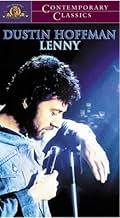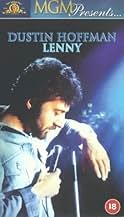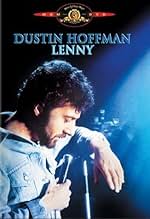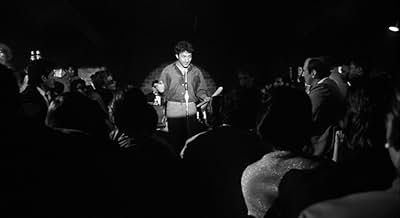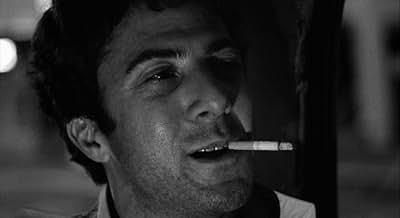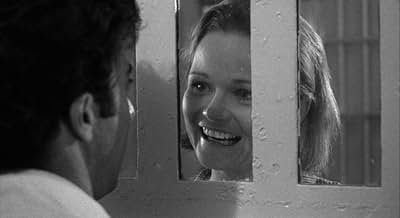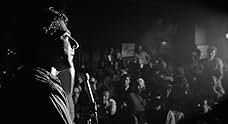La storia del feroce comico degli anni Sessanta Lenny Bruce, il cui stile innovativo e disinvolto e il cui commento sociale erano spesso visti dall'establishment come troppo osceni per il pu... Leggi tuttoLa storia del feroce comico degli anni Sessanta Lenny Bruce, il cui stile innovativo e disinvolto e il cui commento sociale erano spesso visti dall'establishment come troppo osceni per il pubblico.La storia del feroce comico degli anni Sessanta Lenny Bruce, il cui stile innovativo e disinvolto e il cui commento sociale erano spesso visti dall'establishment come troppo osceni per il pubblico.
- Candidato a 6 Oscar
- 7 vittorie e 17 candidature totali
- Girl
- (as Kathie Witt)
- Hawaiian Judge
- (as Monroe Meyers)
Recensioni in evidenza
He was infamously arrested over a dozen or so times for speaking offensively in comedy clubs, and eventually began to represent himself in court. He never gained respect when he was alive, and so he died a frustrated, misunderstood soul who was simply far too ahead of his time.
The masses didn't get him. His racial jokes and political satire was misinterpreted and taken at face value. His sermons ridiculing religion drew hate from conservative Americans.
But Bruce enjoyed toying with words, and bending the typical perception of what they symbolized he cherished the impact they had on people. When Bruce said a certain four-letter expletive, it wasn't to purposely offend people it was to help liberate their ways of thinking. Words were an entryway - once he could knock people off-balance, he was free to go for the throat. He used foul language in the same way as he used words dealing with religion, homosexuals, politics and the world he used them to make a point. And it's a shame his point didn't resonate until after his death.
The makers of "Lenny" understood Bruce, though. They also understood his flaws as a human being, and the result is an unflinchingly honest biopic that paints a dark, staunch portrait of a troubled man. Dustin Hoffman presents Lenny as an alternately despicable and heroic figure, and there is a spark in his eyes throughout the early scenes of the movie that eventually gives way to desperation later in the picture. Hoffman is so convincing we forget we are watching an actor. He entirely embodies himself within Lenny Bruce, adapting all of the comic's tics and habits.
The movie is told from the perspective of those who knew Bruce his wife, Honey (Valerie Perrine), his aunt, and his manager. The narrative cuts back and forth between scenes with Lenny and interview segments, which we see through the eyes of an off-screen interviewer (whose voice is none other than the movie's director, Bob Fosse).
"Lenny" is an uncomfortable film, and it is not by any means perfect. The matter-of-fact narrative is a bit alienating and prevents us from getting entirely close to Bruce but that may very well have been the point. A more heartfelt biography of the performer perhaps would have restricted Fosse and screenwriter Julian Barry from divulging into Lenny's more seedy character traits such as when he coerces his unwilling wife into a threesome with another woman, later ridiculing her for doing so; or when he goes on stage completely drugged out of his mind and makes a fool of himself. If they had allowed audiences to empathize with Bruce to a greater degree, truth may have been sacrificed along the way. And although the narrative is rather cold, it's also unique sometimes refreshingly so.
Despite imperfections, "Lenny" is one of the better motion pictures of the 1970s and perhaps one of the movies that best capture the essence of cinema from a time when the mainstream and art-house were coexistent.
It is a typical 1970s production insofar as that it is grim, bleak and more depressing than any production you would have seen on the screen a decade earlier but it's an admirable feat. Fosse has a close grip on the direction and Hoffman and Perrine are both absolutely superb, bringing to life two very tortured souls who temporarily found solace in each other, before finding their relationship put to the test by drug abuse and self-loathing.
Lenny died from a heroin overdose in 1966. In 2003 he was granted a posthumous pardon by New York State for his most notable arrest in 1964, for an "obscene performance." It's a nice gesture, although one can't help but think it would have only really made a difference 40 years ago.
It is a fascinating film though, in its own way. Fosse uses a documentary-like approach, complete with black and white photography and a narrative device in which we see Bruce's long-suffering love (played heartbreakingly by Valerie Perrine, Lex Luthor's bikini-clad girlfriend in "Superman" [1978]) telling Bruce's story to a filmmaker while the actual events themselves are played out as flashbacks. Fosse was fond of this confessional type of storytelling and would use it again in "All That Jazz" (1979). Dustin Hoffman is simply sensational as Bruce; he utterly disappears into this caustic character until no trace of Hoffman the actor is left. Technically, everything about the film is highly accomplished, but it's so desolately grim as to be off putting.
Grade: B+
Lenny starts out trying to do bits like any other comic of the day - the early 50s, and he fails at it. He then starts to do more commentary on the human condition as stand-up, and that's where he hits his mark. Especially at a time of great societal change like the late 50s/early 60s. Today, that's the stuff of pretty much all stand-up comics, so it's hard to appreciate just how ground-breaking it was at the time. It's like trying to appreciate how ground-breaking "Citizen Kane" was in 1941. It's still an interesting film, but it's just impossible to appreciate it as next-level filmmaking like it was at the time.
My big takeaway was that director Bob Fosse really knows how to tell a story with editing. There are sequences in all of his movies where I would say, 'Wow,' just to an editing choice. Lenny impressed me the most in that regard. As for Valerie Perrine as Lenny's wife - I think that had she been up for Best Supporting Actress Oscar instead of Best Actress, she would have won that category. She was striking as a woman who went along with the choices that her husband made for the both of them with not much if any input from her, and later got blamed by him and society for that matter for going along with those choices. In that regard, she was a more conventional wife of the 1950s than you would think.
And the use of black and white was great. The movie did give Lenny the appreciation that he deserved, mainly by showing his troubled personal life and his troubles with the law. The movie portrayed the trouble and basically harassment that Lenny went through when he voiced his observations of society, which were true, but weren't quite ready to be heard yet. The only fault (if at all) of the film is that it didn't quite show Lenny's genius in what he did. It definitely showed his potential but not quite his brilliance. But this might be because it was a biography of sorts of his life which included his personal and public life. I suppose if the movie just focused on his comedic talents; than his genius would have been obvious, but that wasn't the focus of the film. All in all this is an excellent movie in what it attempted to do. It accomplished what it set out to do and that's what counts.
Lo sapevi?
- QuizThe scene in which Lenny Bruce does his act in a raincoat, near the movie's end, came from a Lenny Bruce show that a student tape-recorded and sent to Dustin Hoffman. Bruce's lines are directly from the tape.
- BlooperDuring the movie's opening monologue, Lenny says that it's 1964 and then references Jerry Lewis's MDA Telethon, which debuted in 1966.
- Citazioni
Lenny Bruce: What's the worst thing you can say to anybody? ''Fuck you, mister!'' That's really weird, because if l wanted to hurt you, l should say, ''Unfuck you, mister'' Because ''fuck you'' is really nice, man.
- ConnessioniFeatured in Precious Images (1986)
I più visti
- How long is Lenny?Powered by Alexa
Dettagli
Botteghino
- Budget
- 2.700.000 USD (previsto)
- Tempo di esecuzione1 ora 51 minuti
- Colore
- Mix di suoni
- Proporzioni
- 1.85 : 1
Contribuisci a questa pagina



